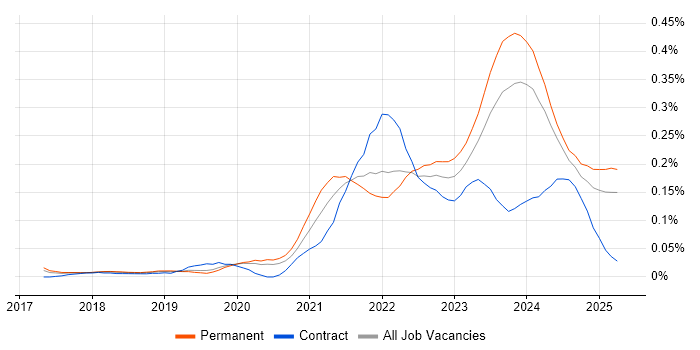Low-Code
England > Midlands
The table below looks at the prevalence of the term Low-Code in permanent job vacancies in the Midlands. Included is a benchmarking guide to the salaries offered in vacancies that cited Low-Code over the 6 months leading up to 23 February 2026, comparing them to the same period in the previous two years.
| 6 months to 23 Feb 2026 |
Same period 2025 | Same period 2024 | |
|---|---|---|---|
| Rank | 211 | 217 | 236 |
| Rank change year-on-year | +6 | +19 | +75 |
| Permanent jobs citing Low-Code | 20 | 14 | 37 |
| As % of all permanent jobs in the Midlands | 0.22% | 0.24% | 0.44% |
| As % of the Miscellaneous category | 0.71% | 0.67% | 1.25% |
| Number of salaries quoted | 14 | 8 | 36 |
| 10th Percentile | £46,625 | £54,500 | £26,000 |
| 25th Percentile | £50,625 | £57,500 | £38,750 |
| Median annual salary (50th Percentile) | £59,527 | £70,000 | £60,750 |
| Median % change year-on-year | -14.96% | +15.23% | +39.66% |
| 75th Percentile | £65,640 | £73,750 | £75,000 |
| 90th Percentile | £103,692 | - | £77,500 |
| England median annual salary | £60,000 | £77,250 | £61,500 |
| % change year-on-year | -22.33% | +25.61% | +6.03% |
All Generic Skills
Midlands
Low-Code falls under the General and Transferable Skills category. For comparison with the information above, the following table provides summary statistics for all permanent job vacancies requiring generic IT skills in the Midlands.
| Permanent vacancies with a requirement for generic IT skills | 2,830 | 2,077 | 2,967 |
| As % of all permanent jobs advertised in the Midlands | 31.18% | 35.95% | 34.94% |
| Number of salaries quoted | 1,170 | 917 | 2,255 |
| 10th Percentile | £26,000 | £31,150 | £25,500 |
| 25th Percentile | £30,000 | £40,000 | £33,750 |
| Median annual salary (50th Percentile) | £45,000 | £55,000 | £50,000 |
| Median % change year-on-year | -18.18% | +10.00% | -9.09% |
| 75th Percentile | £63,750 | £66,967 | £62,500 |
| 90th Percentile | £77,500 | £75,200 | £73,750 |
| England median annual salary | £55,000 | £62,500 | £55,001 |
| % change year-on-year | -12.00% | +13.64% | -15.38% |
Low-Code
Job Vacancy Trend in the Midlands
Historical trend showing the proportion of permanent IT job postings citing Low-Code relative to all permanent IT jobs advertised in the Midlands.

Low-Code
Salary Trend in the Midlands
Salary distribution trend for jobs in the Midlands citing Low-Code.

Low-Code
Salary Histogram in the Midlands
Salary distribution for jobs citing Low-Code in the Midlands over the 6 months to 23 February 2026.
Low-Code
Job Locations in the Midlands
The table below looks at the demand and provides a guide to the median salaries quoted in IT jobs citing Low-Code within the Midlands region over the 6 months to 23 February 2026. The 'Rank Change' column provides an indication of the change in demand within each location based on the same 6 month period last year.
| Location | Rank Change on Same Period Last Year |
Matching Permanent IT Job Ads |
Median Salary Past 6 Months |
Median Salary % Change on Same Period Last Year |
Live Jobs |
|---|---|---|---|---|---|
| West Midlands | +7 | 11 | £61,301 | -12.43% | 3 |
| East Midlands | - | 9 | £48,750 | - | 2 |
| Low-Code England |
|||||
Low-Code
Co-Occurring Skills & Capabilities in the Midlands by Category
The following tables expand on the one above by listing co-occurrences grouped by category. They cover the same employment type, locality and period, with up to 20 co-occurrences shown in each category:
